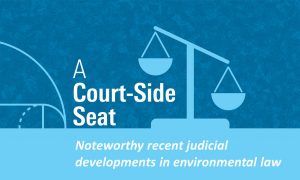THE FEDERAL APPELLATE COURTS
The U.S. Court of Appeals
On November 23, 2020, the court, in a 2-to-1 vote, rejected the plaintiff’s request for an emergency injunction pending appeal in the case of Manzanita Band of Kumeyaay Nation, et al. v. Wolf. The majority held the requirement for such relief did not meet the requirements set forth in Winter v. NRDC, 555 US 7 (2008). Here, the plaintiffs allege that that the government’s construction of a border wall violates several environmental laws that were illegally waived by the Secretary of the Interior. Judge Millett dissented in part because the plaintiffs demonstrated a likelihood of success on the merits. She pointed to the argument that the authority of the Secretary—or Acting Secretary—to take these actions has been successfully challenged in several federal district courts. An expedited pleading schedule was established by the court.
The U.S. Court of Appeals for the Fourth Circuit
On November 17, 2020, in Ergon-West ,Inc. v. EPA, the court again reversed the EPA’s decision denying regulatory relief to a small refinery seeking a waiver of the renewable fuels mandate of the Clean Air Act. Ergon is a small refinery and requested relief in the basis of the economic harm that compliance would entail. In 2018, the court ruled in Ergon’s favor and remanded the case back to the agency. After relief was again denied, the court held that “Ergon has come forward with sufficient evidence undermining one aspect” of the agency’s latest decision, and the ruling was returned to EPA for additional analysis. It appears that a complicated process has become even more complicated.
On November 19, 2020, in McKiver v. Murphy-Brown, LLC, the Fourth Circuit affirmed the lower court’s ruling that the owners and operators of a large hog production facility could be held liable under state law for the noxious odors and other adverse conditions created by their operations. The court affirmed the award of compensatory damage, but vacated the amount of punitive damages. Judge Wilkinson in his concurrence was especially critical of the “unreformed practices of hog farming” that have caused such distress. The dissenting judge pointed out that there were some environmental justice issues at play here; the community in which the hog farming operation are located is a low-income county.
The U.S. Court of Appeals for the Eighth Circuit
On November 20, 2020, the court decided the case of Voigt, et al. v. Coyote Creek Mining Company, LLC. The plaintiffs, North Dakota ranchers and neighbors of a coal processing operation, alleged that the defendants failed to obtain a Clean Air Act construction permit before they constructed the facility, and failed to implement a required dust control plan. The lower court, after reviewing federal law and guidance and the permitting decisions of the North Dakota Department of Health, held that the arguably applicable laws and regulations did not apply to this particular facility. The coal storage pile is not subject to regulation because the regulations are ambiguous, and the court deferred to the permitting decision of the state authorities. The appeals court, in a 2-to-1 ruling affirmed the holding of the lower court. The dissenting judge noted that “most Americans would be surprised to learn that state bureaucrats can play an even larger role than federal judges do in interpreting federal law.” In doing so, the judge states that the panel has established “Voigt Deference “where the legitimacy of a permitting decision can be decided by a state engineer working for the NDDOH.
FEDERAL REGULATORY DEVELOPMENTS
EPA
On November 19, 2020, EPA published a final rule regarding the Reclassification of Major Sources of Air Pollution. (See 85 FR 73854.) A major source of air pollution can be reclassified as an area source once its potential to emit hazardous air pollutants below a threshold takes effect. The rule is effective on January 19, 2021.
On November 18, 2020, EPA announced that it has scheduled public hearings on a new Clean Water Act rule regulating incidental discharges from covered vessels. (See 85 FR 73438.)
On November 23, 2020, EPA published a notice that the State of Texas had submitted a request to amend its NPDES delegated authority to include regulating discharges from the oil and gas sector, following the enactment of state legislation to substitute the TCEQ for the Texas Railroad Commission. (See 85 FR 76073.)
Department of Transportation
The Pipeline and Hazardous Material Administration published a final rule that cleans up, updates, clarifies and provides some regulatory relief from the Hazardous Material rules located at 49 CFR Part 107. (See 85 FR 75680.) The rule is effective on December 28, 2020.
Department of the Treasury, Office of the Comptroller General
On November 20, 2020, the Comptroller published a notice seeking comments on a proposed new rule, “Fair Access to Financial Sources.” In general the agency would promulgate a new rule affecting the financial community to ensure that important extractive industries have access to capital as they attempt to develop coal mining and oil and gas projects, which have been criticized in some quarters. Comments are due on January 4, 2021. See 85 FR 75261.
Department of Commerce
New Export Control Act enforcement rules have been published. (See 85 FR 73411 November 18, 2020).
Department of Agriculture
The U.S. Forest Service has published a final rule amending its NEPA rules, which now include new and revised categorical exclusions.
Federal Permitting Improvement Steering Council
On November 27, 2020, the Council added mining to the list of FAST-41 sectors eligible for this accelerated federal permitting processing under the FAST Act. (See 85 FR 75998.)
 Gravel2Gavel Construction & Real Estate Law Blog
Gravel2Gavel Construction & Real Estate Law Blog



